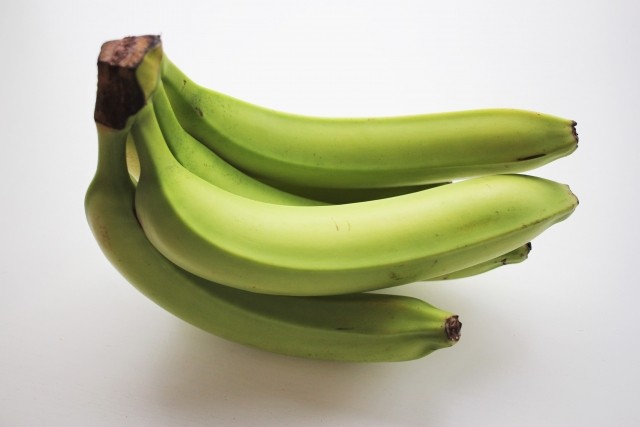
Traditionally in Japan, we call a “green” traffic light “blue.” Same thing is true for the saying, “The grass is always greener on the other side of the fence.” In Japanese, “green” literally translates to “blue.” 隣りの芝は青い。 This is not because we, Japanese people, are colorblind or can not tell the difference between green and blue. (I was once asked if we are colorblind, which is not the case.)
Anyway, on the way drive back home after picking my daughter up from school, she was eating a banana for her snack. As usual we spoke in Japanese (opposed to English) so this is a rough translation of our conversation.
She said she didn’t like the brown spots on the banana. I said, “It may be too ripe for you.” She asked me the meaning of “ripe”, so I explained it using an example of a green banana . “You’ve seen the blue bananas at the supermarket, right? They’re not ready to eat yet, right? The blue bananas become yellow as they ripen, and eventually they turn brown if they ripen too much.” My daughter was like, “Hmmm…I see.” After a moment, she started laughing and said, “It’s green! Not blue bananas.”
Yes, that’s true! And I didn’t realize until she pointed out that I was seeing those green bananas in my mind as “blue”. Well, it’s kind of tricky because my mental picture of those bananas are still green physically but my brain processes the color as blue. I found it very interesting. Then I explained to her that in Japan we describe some fruits and vegetables as being blue when they are not ripe enough or when someone who is too young/immature…as well as traffic light. A green traffic light in Japan is called a blue traffic light.
I used to say “It’s blue” at intersections while my husband was driving (I’m a back seat driver.) I know it’s annoying haha, but my husband also didn’t forget to tell me “It’s GREEN.” I did this so my daughter knows the green traffic light is called “blue.”
We are traveling to Japan for summer vacation, while we are there she is being enrolled into a Japanese elementary school for about two months. So she said, “By force of habit, I may accidentally say “green” instead of “blue” in Japan. Haha.”
Interesting how some words do not translate from smoothly from one language to another.
Yeah, that's always an interesting discussion. I see the concept of 青 encompassing both green and blue.
Some languages make more or fewer distinctions than others. For example, we say broil, bake, grill, or fry depending on the situation while in Japan they just say 焼く haha
EDIT: BTW I didn't see any big issues with the writing here. Pretty much scraping the corners of the box with my corrections (or whatever that Japanese saying is haha). Your English level appears to be highly advanced.
Do you know there are African languages that only use red, white and black? On the other hand, I see that interior decorators have millions of colour words...
Hi @T-Newfields! Thank you very much for your feedback and comments! Yes, I feel like oftentimes translating from one language to another is not that easy. Need to have good understanding of the cultures.
Hi @amoosey! Thank you very much for your feedback and encouraging comments! That’s true about the differences between “焼く” in Japanese and English. For the first couple of years here in the US, I didn’t use the broil function on oven at all because I didn't know the difference between "bake" and "broil". I should have looked up the meaning of “broil” but I was lazy. Haha.
Hi @MusiqueGraeme! Thank you very much for your feedback and comments! That’s interesting to know about those African languages. I’ve heard the similar things about the color, the weather etc, too. While some people in some culture(s) can see /tell the fine differences in some things according to the number of the words they have about the things, others cannot.